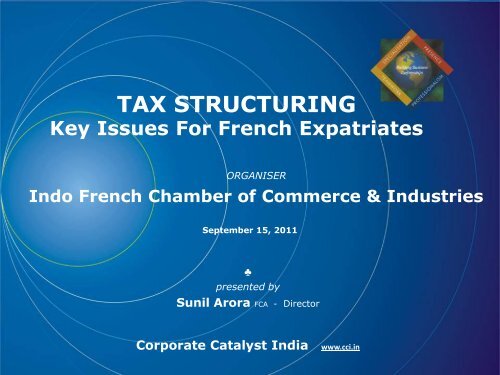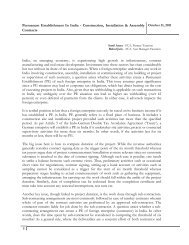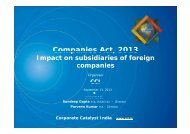TAX STRUCTURING - Corporate Catalyst India
TAX STRUCTURING - Corporate Catalyst India
TAX STRUCTURING - Corporate Catalyst India
You also want an ePaper? Increase the reach of your titles
YUMPU automatically turns print PDFs into web optimized ePapers that Google loves.
<strong>TAX</strong> <strong>STRUCTURING</strong><br />
Key Issues For French Expatriates<br />
ORGANISER<br />
Indo French Chamber of Commerce & Industries<br />
September 15, 2011<br />
♣<br />
presented by<br />
Sunil Arora FCA - Director<br />
<strong>Corporate</strong> <strong>Catalyst</strong> <strong>India</strong> www.cci.in
Overview<br />
Specific Issues<br />
PRESENTATION OUTLINE<br />
Regional Responsibility – extent of taxability in <strong>India</strong><br />
Short Stay Exemption – relief under tax treaty<br />
Accommodation – who should lease<br />
Social Security Contributions in France – whether fully taxable<br />
Tax Equalisation – effective protection mechanism<br />
Regulatory Issues – payroll structuring<br />
About ASA/CCI<br />
2
Scope of Taxation<br />
Resident Non Resident („NR‟)<br />
Ordinarily Resident („OR‟) Not Ordinarily Resident („NOR‟)<br />
Worldwide Income<br />
OVERVIEW<br />
<br />
<strong>India</strong> sourced/ received<br />
Income<br />
<strong>India</strong> sourced/ received<br />
income<br />
3
Scope of Taxation<br />
Resident v Non-Resident („NR‟)<br />
Primary Condition - Stay of 182 days in a single year OR 60 days in a single<br />
year & 365 days in last four years<br />
OVERVIEW<br />
Secondary Condition - Stayed less than 730 days in <strong>India</strong> in last seven years<br />
OR Non resident in nine out of ten preceding years<br />
Not Ordinarily Resident („NOR‟) is a privileged status which usually runs<br />
for 3-4 years from the date of first entry into <strong>India</strong><br />
Losing the NOR status effectively means that global income would be<br />
reported to <strong>India</strong>. Though relief can be claimed under tax treaty, but<br />
reporting requirement remains 4
Scope of Taxation<br />
OVERVIEW<br />
Arrival in <strong>India</strong> on April 1, 2010<br />
Fiscal Year Stay in <strong>India</strong> Residential Status<br />
2010-11 300/ 0 Resident; Not Ordinary *<br />
2011-12 300/ 300 Resident; Not Ordinary *<br />
2012-13 300/ 600 Resident; Not Ordinary *<br />
2013-14 200/ 900 Resident; Ordinary **<br />
* aggregate stay in past 7 years is less than 729 days<br />
** aggregate stay in past 7 years is more than 729 days<br />
The NOR status is available for 3 fiscal years<br />
5
Scope of Taxation<br />
OVERVIEW<br />
Arrival in <strong>India</strong> on September 1, 2010<br />
Fiscal Year Stay in <strong>India</strong> Residential Status<br />
2010-11 190/ 0 Resident; Not Ordinary *<br />
2011-12 260/ 190 Resident; Not Ordinary *<br />
2012-13 260/ 450 Resident; Not Ordinary *<br />
2013-14 260/ 710 Resident; Not Ordinary *<br />
2014-15 260/ 970 Resident; Ordinary **<br />
* aggregate stay in past 7 years is less than 729 days<br />
** aggregate stay in past 7 years is more than 729 days<br />
The NOR status is available for an extended period of 4 fiscal years 6
Taxable Income<br />
Salary & Allowances<br />
Perquisites<br />
Accommodation<br />
Social Security Benefits<br />
Any other benefit<br />
Tax Equalisation - To bridge parity between difference in tax rates of two or more<br />
tax jurisdictions<br />
OVERVIEW<br />
Tax is computed based on slab rates applicable to individuals. Broadly, the first<br />
INR 800,000 of income attracts nearly INR 90,000 of tax amount. The balance is<br />
taxed at 30%. Aggregate tax is then enhanced by a cess (additional tax) of 3%.<br />
7
REGIONAL RESPONSIBILITY<br />
“What will be the impact on tax of an expatriate posted to <strong>India</strong> with<br />
responsibility to servicing adjoining regions viz. Nepal, Bhutan, Sri<br />
Lanka, Bangladesh etc.?”<br />
10
REGIONAL RESPONSIBILITY – CASE STUDY<br />
Stephen Brandon v CIT (Income Tax Tribunal, Delhi)<br />
S, a foreign national was a Not Ordinarily Resident („NOR‟) in <strong>India</strong>. His contract<br />
included servicing the South East Asia region and his remuneration was paid in<br />
foreign currency outside <strong>India</strong>. The employer‟s Asia office was <strong>India</strong><br />
Besides servicing in <strong>India</strong>, Mr S made visits to adjoining countries viz. Nepal,<br />
Pakistan, Sri-Lanka to perform work assignments and thus offered proportionate<br />
salary to tax in <strong>India</strong><br />
Tax officer observed that the company was headquartered in <strong>India</strong> and thus Mr S<br />
continued to render services in <strong>India</strong> even when he performs assignments in<br />
adjoining countries. Therefore, his entire salary is taxable in <strong>India</strong><br />
The tribunal (court) relied on the contractual responsibility of Mr S and details of<br />
actual work performed in adjoining regions and taxed only salary earned for services<br />
rendered in <strong>India</strong><br />
11
Experience Based Advice<br />
Pointers<br />
Exemption only available to NOR‟s<br />
Contractual responsibility for the region is a must<br />
Details of work done in adjoining regions not <strong>India</strong> linked<br />
Period of personal visits / holidays – taxed in <strong>India</strong><br />
Receive separate salary for each region serviced<br />
Documentation<br />
REGIONAL RESPONSIBILITY<br />
Maintain travel log with details of services rendered in adjoining regions<br />
Calculation of exact days outside <strong>India</strong> reconciled to passport entries<br />
“Exemption available on case to case basis; likely to be challenged by revenue<br />
authorities at initial levels”<br />
12
13<br />
13
SHORT STAY EXEMPTION<br />
“What will be the impact on tax of an expatriate posted to <strong>India</strong> for<br />
short periods – projects, branch, engineering purpose etc.?”<br />
14
A specific provision under the tax treaty is relevant. It relates to<br />
„Dependent Personal Service‟ i.e. Deputation to <strong>India</strong> on salaried basis<br />
(article 16 of Indo-French tax treaty) – Non taxable in <strong>India</strong> when<br />
Stay in <strong>India</strong> < 183 days during financial year; and<br />
Salary not paid by or on behalf of an <strong>India</strong>n Co; and<br />
Salary not borne by any fixed base/Permanent Establishment („PE‟) of non-<br />
resident employer in <strong>India</strong><br />
SHORT STAY EXEMPTION<br />
15
Meant for dependant personnel – salaried staff<br />
Prime purpose is to avoid hardship of paying individual taxes for short<br />
stay expats<br />
SHORT STAY EXEMPTION<br />
All conditions must be simultaneously fulfilled<br />
If short stay relief is claimed, <strong>India</strong>n project/branch/PE cannot claim<br />
expenditure of salary paid to such expats<br />
“Essentially a cost benefit analysis from an individual and corporate<br />
tax perspective”<br />
16
ACCOMMODATION<br />
“Can the lease arrangement for expatriate accommodation be<br />
optimised for tax purposes?”<br />
18
ACCOMMODATION<br />
Rent Free Accommodation („RFA‟) - Accommodation provided by employer is<br />
treated as a perquisite and taxed at 15% of salary<br />
House Rental Allowance („HRA‟) - Reimbursement of lease amount for<br />
accommodation leased by the employee himself is considered as an<br />
allowance, which is taxed on actual, as reduced by the lower of<br />
50% of salary<br />
allowance received from employer<br />
excess of rent paid over 10% of salary<br />
“Difference in tax incidence under both arrangements can cause<br />
optimisation of take home pay”<br />
19
Example<br />
ACCOMMODATION<br />
a) Cost of Employee to Company (CTC) = € 100,000<br />
b) Rent paid in <strong>India</strong> = € 1,500 per month (Annually € 18,000)<br />
Taxability under Alternate Rental Arrangements<br />
Particulars Employer Lease Employee Lease<br />
Salary (A) 82,000 82,000<br />
Lease Charges Paid by Employer (B) 18,000<br />
Lease Charges Paid by Employee; Reimbursed to Employee (B) 18,000<br />
Total CTC (A+B) 100,000 100,000<br />
Cost of Benefit (15% on Salary) 12,300<br />
Taxable Component of Rent Reimbursement 8,200<br />
Taxable Salary 94,300 90,200<br />
Tax Payable (@30.9%) (C) 29,140 27,870<br />
Effective Take Home (A-C) 52,860 54,130<br />
“As a thumb rule, employee arranged accommodation generally provides higher tax efficiency”<br />
20
21<br />
21
PENSION & MEDICAL FUND CONTRIBUTION<br />
“Whether Social Security Contributions made by employer in home<br />
country taxable in <strong>India</strong>?”<br />
22
PENSION & MEDICAL FUND CONTRIBUTION<br />
Employees attached to parent company generally contribute to the<br />
social security schemes in home country. The employer contributes<br />
an equal amount to such funds. Tax treatment of employer‟s share<br />
to such funds is the subject matter of litigation in <strong>India</strong><br />
The Supreme Court of <strong>India</strong> (i.e. apex judicial body) has decided<br />
that unless, by virtue of employer‟s contributions, the employee<br />
acquires vested rights in such social security funds, such<br />
contributions cannot be taxed in <strong>India</strong><br />
Applying this analogy to contribution towards pension funds,<br />
wherein benefits are only available post retirement, it is clear<br />
that employees do not acquire any vested right in such pension fund<br />
during their term of employment. Thus, no taxability arises in <strong>India</strong><br />
23
PENSION & MEDICAL FUND CONTRIBUTION<br />
Applying the same analogy to Medical Insurance Contributions,<br />
wherein benefit remains vested in the employee throughout his<br />
life, it is clear that employees do acquire vested right during the<br />
term of employment and thus, taxability arises<br />
“Important to examine the point of vesting under the specific social<br />
security scheme”<br />
24
25<br />
25
<strong>TAX</strong> EQUALISATION<br />
“ An expatriate, when deputed to <strong>India</strong> may get affected by a higher rate<br />
or incidence of tax. What planning is possible so that he does not pay<br />
tax higher than what would be charged on his income in France?”<br />
26
Particulars Amount (EURO)<br />
Salary from Employer in France (Cash) 100,000<br />
Add: Value of Perquisites viz<br />
- Accommodation (15% of salary) 15,000<br />
Total/Taxable Income<br />
115,000<br />
Tax on Total Income 35,000<br />
Bifurcated Into -<br />
Tax on Salary<br />
Tax on Perquisites<br />
<strong>TAX</strong> EQUALISATION – CASE STUDY<br />
30,000<br />
5,000<br />
27
<strong>TAX</strong> EQUALISATION – CASE STUDY<br />
Take Home Pay in <strong>India</strong> and France<br />
France <strong>India</strong><br />
Salary 100,000 100,000<br />
Less: Tax on Salary 30,000 35,000<br />
Desired Take Home Pay 70,000 65,000<br />
Tax On Perquisites – Reimbursed by Employer<br />
Salary (In Cash) 100,000<br />
Add: Tax on Perquisites reimbursed 5,000<br />
Total Salary (In Cash) 105,000<br />
Add: Value of Benefits/Perquisites 15,000<br />
Revised Taxable Income 120,000<br />
Revised Tax Liability 37,000<br />
Actual Take Home Pay (Cash Salary less Tax Liability) 68,000<br />
28
<strong>TAX</strong> EQUALISATION – CASE STUDY<br />
Take Home Pay in <strong>India</strong> and France<br />
Tax On Perquisites – Reimbursed by Employer<br />
France <strong>India</strong><br />
Salary 100,000 105,000<br />
Less: Tax on Salary 30,000 37,000<br />
Desired Take Home Pay 70,000 68,000<br />
Salary (In Cash) 100,000<br />
Add: Tax on Perquisites reimbursed 5,000<br />
ADD: ADDITIONAL COMPENSATION 3,000<br />
Total Salary (In Cash) 108,000<br />
Add: Value of Benefits/Perquisites 17,000<br />
Revised Taxable Income 125,000<br />
Revised Tax Liability 38,000<br />
Actual Take Home Pay (Cash Salary less Tax Liability) 70,000<br />
29
REGULATORY ISSUES<br />
“ Is it possible to split total salary into <strong>India</strong> and France?”<br />
“ Is it possible to pay the entire salary in an offshore jurisdiction?”<br />
“ at what rate salary paid outside <strong>India</strong> converted for tax purposes?”<br />
31
When deciding a split salary or an overseas salary arrangement, the<br />
main consideration is discharge of tax liability in <strong>India</strong><br />
From a regulatory perspective, the Foreign Exchange Management<br />
Act (FEMA) allows payment of full/part salary out of <strong>India</strong> or<br />
alternatively, remittance of tax paid salary to an offshore jurisdiction.<br />
Taxability of such salary remains the only consideration (ref Master<br />
Circular of RBI)<br />
REGULATORY ISSUES<br />
“No regulatory hurdle in planning a split/overseas payroll”<br />
32
REGULATORY ISSUES<br />
Salary paid outside <strong>India</strong> is converted into INR using the TT Buying<br />
Rate as existing on the last day of immediately preceding month<br />
“ Taxable salary can be marginally higher than what is actually<br />
withdrawn by the employee”<br />
33
ABOUT US<br />
<strong>Corporate</strong> <strong>Catalyst</strong> <strong>India</strong><br />
(in joint venture with SCS Global)<br />
&<br />
ASA & Associates chartered accountants<br />
(a member firm of NIS Global)<br />
34<br />
34
CCI – joint venture with SCS Global<br />
ASA - member of NIS Global, an international association of independent<br />
accounting firms<br />
Own offices in 8 cities i.e. Delhi, Mumbai, Bangalore, Ahmedabad,<br />
Chennai, Hyderabad, Kochi and Gurgaon<br />
Approximately 70 per cent are overseas clients<br />
Offices across <strong>India</strong> and affiliations worldwide<br />
More than 20 years work experience<br />
Professional staff strength of about 350 in <strong>India</strong> & 1,500 through<br />
associate network<br />
OUR STRENGTHS<br />
35
Services<br />
OUR SERVICES<br />
Business Advisory – Inbound investments<br />
Transaction Advisory – M&A, Restructuring<br />
Market Research/ Industrial Analysis<br />
Tax – Expatriates, Transfer Pricing, <strong>Corporate</strong><br />
Compliance – Bookkeeping, IFRS, SOX<br />
Audit – Statutory, Internal<br />
36<br />
36
THANK YOU<br />
Sunil Arora I Director I<br />
sunil.arora@cci.in<br />
<strong>Corporate</strong> <strong>Catalyst</strong> <strong>India</strong> www.cci.in<br />
37
ACCOMMODATION<br />
Income-tax Slab Rates (FY 2011-12)<br />
Income Range (`) Rate of Tax (%)<br />
Upto 180,000* Nil<br />
180,001 – 500,000 10<br />
500,001 – 800,000 20<br />
* Exemption Limit for Women at ` 190,000 and for senior citizen is ` 250,000<br />
Above 800,000 30<br />
* Exemption Limit for Women at INR 190,000 and for senior citizen INR 250,000<br />
Back<br />
38
EXCHANGE CONTROL REGULATIONS<br />
Extracts from Para 6 Master Circular dt July 1, 2011<br />
As per para 6 of the master circular dated July 1, 2011 issued by Reserve Bank of <strong>India</strong> (Apex<br />
Regulatory Body) both Foreign and <strong>India</strong>n nationals are permitted to repatriate their<br />
remuneration outside <strong>India</strong> or directly receive the same out of <strong>India</strong>. The para states that<br />
A citizen of a foreign state resident in <strong>India</strong>, being an employee of a foreign company and<br />
on deputation to the office/ branch/ subsidiary/ joint venture in <strong>India</strong> of such foreign<br />
company or being an employee of a company incorporated in <strong>India</strong>, may open, hold and<br />
maintain a foreign currency account with a bank outside <strong>India</strong> and receive/ remit the whole<br />
salary payable to him for the services rendered, by credit to such account, provided that<br />
income tax chargeable under the Income Tax Act, 1961 is paid on the entire salary as<br />
accrued in <strong>India</strong>.<br />
A citizen of <strong>India</strong>, employed by a foreign company outside <strong>India</strong> and on deputation to the<br />
office/ branch/ subsidiary/ joint venture in <strong>India</strong> of such foreign company, may open, hold<br />
and maintain a foreign currency account with a bank outside <strong>India</strong> and receive the whole<br />
salary payable to him for the services rendered to the office/ branch/ subsidiary/ joint<br />
venture in <strong>India</strong> of such foreign company, by credit to such account, provided that income<br />
tax chargeable under the Income Tax Act, 1961 is paid on the entire salary as accrued in<br />
<strong>India</strong><br />
Back<br />
39
DEPENDENT PERSONAL SERVICES – ARTICLE 16<br />
1) Subject to the provision of Articles 17, 18, 19, 20, 21 and 22, salaries, wages and other<br />
similar remuneration derived by a resident of a Contracting State in respect of an<br />
employment shall be taxable only in that Contracting State unless the employment is<br />
exercised in the other Contracting State. If the employment is so exercised, such<br />
remuneration as is derived there from may be taxed in that other Contracting State.<br />
2) Notwithstanding the provisions of paragraph 1 , remuneration derived by a resident of a<br />
Contracting State in respect of an employment exercised in the other Contracting State<br />
shall be taxable only in the first mentioned Contracting State if:<br />
the recipient is present in the other Contracting State for a period or periods not<br />
exceeding in the aggregate 183 days in the relevant "fiscal year"; and<br />
(b) the remuneration is paid by, or on behalf of, an employer who is not a resident of the<br />
other Contracting State; and<br />
(c) the remuneration is not borne by the permanent establishment or a fixed base which<br />
the employer has in the other Contracting State.<br />
3) Notwithstanding the preceding provisions of this Article, remuneration derived in respect of<br />
an employment exercised aboard a ship or aircraft operated in international traffic by an<br />
enterprise of a Contracting State may be taxed in that Contracting State.<br />
Back<br />
40




